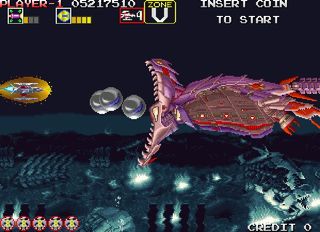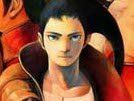The Darius shooter series is known for a lot of things – challenging side-scrolling shooter action, branching multiple-choice stages and huge, awesome enemy ships modeled after all the wonderfully creepy things that dwell in the sea depths. But perhaps what I enjoy most about it is the phenomenal music. Every arcade installment of the series since its original 1987 outing has played host to a soundtrack that is unique, unexpected and amazing. One could spend a whole week of Game Music of the Day just highlighting Darius music, but for today I’m going to focus on what is my favorite game soundtrack of all time: Darius Gaiden.
The arcade market in the early 90s was an interesting one. Street Fighter II had put people back into the game centers in droves, and SNK had proven with its Neo Geo MVSthat you didn’t need to constantly one-up the competition with expensive specialty hardware to find success. Taking a cue from the MVS’s easily exchangeable cartridge system, Taito created the technically superior F3 Cybercore hardware, which operated on a similar principle. It was first introduced in 1992, and by 1994 it played host to classics like Bubble Symphony, Rayforce, and today’s highlight, Darius Gaiden.
Game: Darius Gaiden
Song: VISONNERZ
Composer: Hisayoshi Ogura (OGR)
Above: VISONNERZ from Darius Gaiden
The best description I can think of to describe the Darius Gaiden soundtrack is “dream-like.” It’s clear you’re in for a trip from the moment you start up and hear this song playing through the first couple of stages. It’s eerie and ephemeral, yet strangely inviting, making use of both loud and soft, whispered vocal samples and sudden, strange changes in instruments and tone. It works to set the stage for the rest of the game’s soundtrack: a mix of fierce-sounding anthems and slow-tempoed, soft sounds.

The music itself is phenomenal, but the way it’s implemented in the game is every bit as impressive. Cues in music will match up to the appearance of an enemy onscreen, sound effects will subtly mix into the song itself, and lengthy stretches of silence will accompany certain areas to create atmosphere. The songs combine with the themed enemies and surreal, ethereal backgrounds to make one of the most unique and awesome shooters ever. It’s a challenging, reflex-heavy game that somehow also feels emotionally complex and profound. One can see this in the battle with Titanic Lance, a sure contender for “hugest boss in gaming history:”
The music alternates between being loud and fast and soft and slow, but despite the striking differences between tracks, all of the songs are united by a powerful, surreal quality.
The final stage music, “Self”, feels to me like the perfect endgame tune. It’s a slower song with a strong beat to it, but what strikes me about it is the mood it projects – a sadness that the game experience is drawing to a close, but also the need to defeat the final, most challenging obstacle standing between you and victory. A piano refrain of the song plays over the closing credits, almost like the echoes of a dream you’ve just woken up from.
It’s a shame that Darius Gaiden never got more exposure outside of Japan. By the time the Cybercore began to hit its stride overseas, Taito decided the North American market wasn’t worth the hassle, exiting entirely by 1995. Notorious crap peddler Acclaim somehow acquired the rights to several Taito arcade ports on the then-new 32-bit platforms, but released the Saturn version of Darius Gaiden stateside with little fanfare. Thus, one of the best shooters of its time was condemned to the bargain bin mere months after release. It’s not too hard to find this one if you’re keen on Saturn collecting, and it’s also available on the Taito Legends 2 compilation set. I cannot recommend it strongly enough for anyone looking for a fantastic, intense audiovisual experience.


Interception by Saori Kobayashi

Neon Night by O’Donnell and Salvatori

Fight!! by Noriyuki Iwadare
